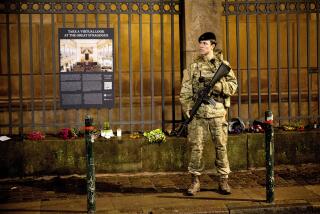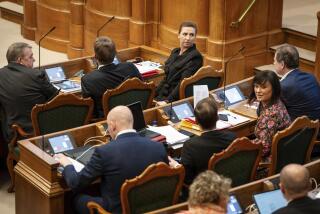Protests Over Cartoons Spread
- Share via
BERLIN — Flags burned and protesters chanted in the Middle East and South Asia as outrage over satirical cartoons of the prophet Muhammad continued to spread Friday from the Pakistani parliament to the streets of Gaza to a meeting between Danish leaders and Muslim diplomats.
The cartoons reprinted this week in European newspapers lampoon Muhammad, with one showing him wearing a turban shaped like a bomb. The caricatures have been condemned by imams as an attack on Islam and have underscored the widening tension between Europeans and Muslim immigrants.
In Copenhagen, Danish Prime Minister Anders Fogh Rasmussen met with ambassadors from Middle East countries in an effort to calm the furor that began in September when the Danish daily Jyllands-Posten first published the cartoons. The 12 drawings have since appeared in newspapers across the continent, becoming emblems in a battle between free speech and religious sensitivities.
“Neither the Danish government nor the Danish nation as such can be held responsible for drawings published in a Danish newspaper,” Rasmussen said after the meeting with envoys. “A Danish government can never apologize on behalf of a free and independent newspaper.... This is basically a dispute between some Muslims and a newspaper.”
The prime minister added that there could be “unpredictable repercussions” if the protests escalated.
The Egyptian ambassador to Denmark, Mona Omar Attiah, indicated that Rasmussen should do more to defuse passions. “I want the prime minister to speak with Jyllands-Posten about getting them to give a real apology,” she said after the meeting.
The Pakistani parliament Friday condemned the cartoons as “blasphemous and derogatory....This vicious, outrageous and provocative campaign cannot be justified in the name of freedom of the press.”
Danish flags have been burned and protests, some of them violent, have been staged at European institutions in Indonesia, the Gaza Strip, Afghanistan and elsewhere. Protesters marched after Friday prayers in Baghdad and Tehran. Boycotts of Danish products across the Middle East are costing Arla Foods, which has operated in the region for nearly 40 years, an estimated $1 million a day, the company said.
In Iraqi mosques Friday, Muslim clerics called on worshipers to condemn the cartoons and for the Danish government to issue an apology.
“We tell our Christian brothers: Those who don’t respect others, do not deserve respect. And yet we still respect the followers of Jesus,” said Sheik Mahmoud Sumaidaie at Baghdad’s Umm Qura Mosque. “We should boycott Denmark, France and Norway ideologically, commercially, politically and diplomatically. To do otherwise is a sin.”
European officials are concerned that Muslim anger could lead to extremist attacks, strain nuclear talks with Iran and further trouble relations with Hamas, the militant group that recently won Palestinian parliamentary elections. Sermons and speeches by religious and radical leaders called for bloodshed against the West. At a demonstration organized by Hamas, tens of thousands of protesters marched in the streets, some of them chanting, “Those responsible should have their hands cut off.”
“It’s certainly true, with the disturbances in the Palestinian areas, that this dispute over the cartoons has influence on the mood in Arab countries,” said German Foreign Minister Frank-Walter Steinmeier. “We are making every effort to damp that down in coming days.”
The drawings, including one that quotes Muhammad as saying heaven has run out of virgins for suicide bombers, sparked brief protests in Denmark when they were published in September.
The controversy grew in recent months after Danish Muslim religious leaders traveled to the Middle East to call attention to what they said was an atmosphere of discrimination and insensitivity in Europe. The group delivered copies of the cartoons to clerics in Egypt and Lebanon.
The cartoons are the latest tension between Muslim immigrants and Europeans after decades of failed integration policies and increasing racism. The Madrid train bombings in 2004 and last year’s attacks on the London transit system have exacerbated the situation. In Denmark and other countries, rightist anti-immigration political parties have gained in the polls as imams, Christian clerics and government leaders have sought to bridge religious and cultural divides.
The integration debate has turned increasingly raw, however, as Europe finds itself navigating between its espousal of multiculturalism and its insecurities over a rapidly growing Muslim population. Even left-leaning publications and politicians are exasperated. This was evident when Rasmussen and Jyllands-Posten attempted to give a Western civics lesson to Muslims, apologizing if the cartoons gave offense, but not for the newspaper’s right to print them.
“Muslims between Copenhagen, Riyadh and Gaza have showed us again what we already knew: They take our Nikes and Cokes, but they don’t accept our culture of fun which ironically mocks,” wrote the leftist German newspaper Die Tageszeitung. “And when an editor in chief and a prime minister apologize for the cartoons, it has become clear again that Westerners are all mollycoddled cowards kneeling down in front of the enemies of freedom.”
British Foreign Minister Jack Straw told reporters that newspapers in Germany, Italy, Spain, France and other countries that published the cartoons in a show of solidarity had acted irresponsibly.
“I believe the republication of these cartoons has been unnecessary, it has been insensitive, it has been disrespectful and it has been wrong,” he said.
*
Times staff writers Solomon Moore in Baghdad and Laura King in Gaza City and special correspondent Helen Hajjaj in Copenhagen contributed to this report.
More to Read
Sign up for Essential California
The most important California stories and recommendations in your inbox every morning.
You may occasionally receive promotional content from the Los Angeles Times.














